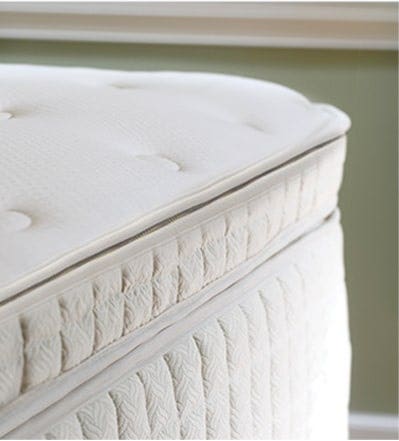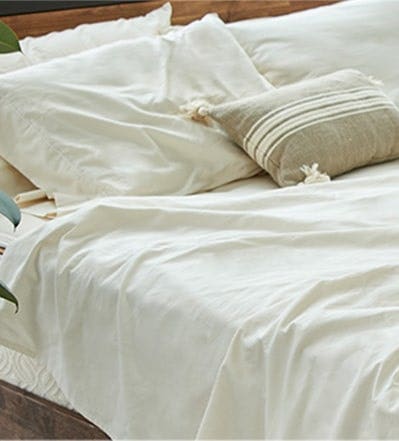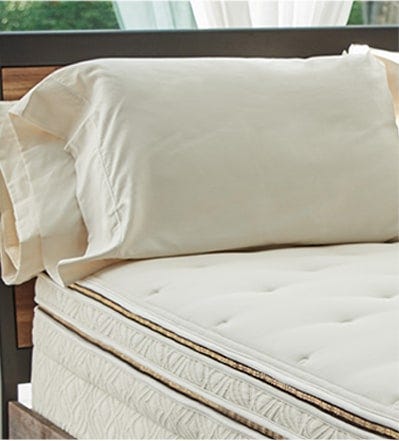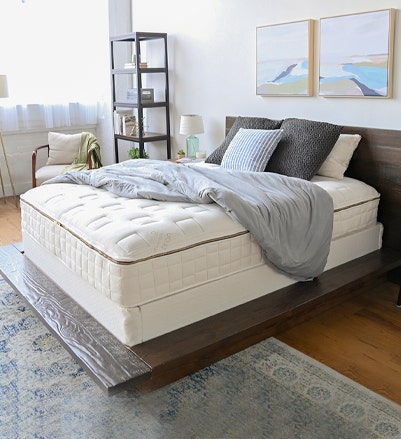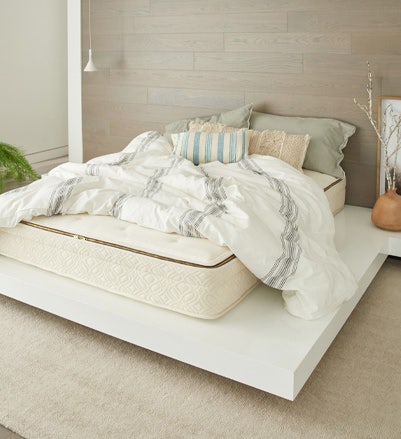In cartoons, snoring seems to equate deep, sound sleep. But, that's far from the case in real life! Snoring can contribute to sleep deprivation, mental health struggles and more. Whether you're tired of your sleep partner's nightly serenade or you're the culprit causing it, you're not alone and you deserve better sleep.
According to John Hopkins Medicine, 45% of adults snore at least occasionally, and a quarter of all adults snore regularly. That makes for a lot of people who likely aren’t getting the quality of sleep they need – and sleep quality is something we take very seriously at Naturepedic! Let's explore some natural remedies for snoring.
Common Causes of Snoring
Step one to stop snoring is understanding why it occurs in the first place. Snoring is essentially the result of airflow obstruction during sleep. As you drift into slumber, the muscles in your throat relax, causing the airway to narrow. This narrowing leads to the vibration of the soft tissues in your throat, creating that infamous snoring sound.
Other factors can contribute to this phenomenon, including:
- Obesity: Carrying excess weight, especially around the neck, can put pressure on the airway, making snoring more likely.
- Sleep Position: Sleeping on your back often allows your tongue and soft palate to collapse to the back of your throat, obstructing airflow.
- Alcohol and Sedatives: These substances relax the throat muscles, increasing the likelihood of snoring.
- Nasal Congestion: When your nasal passages are blocked due to allergies or illness, you're more likely to breathe through your mouth, which can lead to snoring.
- Age: As you age, the throat muscles tend to weaken, making snoring more prevalent.
- Smoking: Smoking irritates and inflames the throat, contributing to snoring.
- Sleep Apnea: A severe condition where breathing repeatedly stops and starts during sleep, sleep apnea is a significant cause of loud snoring and should be diagnosed and treated by a medical professional.
Is Your Pillow Part of the Problem?
Believe it or not, your choice of pillow can play a significant role in your snoring habits. An improper pillow can affect your sleeping posture and exacerbate snoring. A pillow that's too high or too flat, for instance, can lead to improper head and neck alignment, potentially restricting your airway and increasing the likelihood of snoring.
In some cases, choosing a pillow made with high quality materials can be the best snoring solution. A PLA Pillow is a great option because the natural resilience of this plant-based batting material prevents sinking and dipping over time. Organic latex is another preferable option, as latex can contour to your head and neck for exceptional support.


Some pillows are designed to encourage side-sleeping, which is often recommended for snorers. Side sleeper pillows can help keep your airway open by preventing you from rolling onto your back during the night.
One last point to consider is allergens in your pillow. Dust mites and other allergens can trigger nasal congestion, making you more prone to snoring. Regularly clean and replace your pillow to keep it clean and allergen-free, and consider investing in a pillow protector, too.
4 Natural Remedies for Snoring
Let's explore some natural remedies for snoring that can help you enjoy healthier sleep and more restful nights.
1. Start with Your Sleep Space
Take a look at your sleep space. Are you sleeping on an old, flat, yellow pillow? It might be time to upgrade.
Elevating your head can help to keep your airway open. Specialized pillows or adjustable bed frames can achieve this effect, but something as simple as your pillow can make a big difference, too. Choose a lofty, supportive pillow, and make sure you’re replacing your pillows often.
And remember: clean your pillows often! Over time, they collect tiny dust mites that can congest your nasal passages. When your airway is blocked, it can worsen snoring – so keep these bedroom allergens out!
2. Sleep on Your Side
As mentioned earlier, sleeping on your back can lead to snoring. Sleeping on your side is one way to discourage snoring. But changing sleep positions when you’ve been sleeping the same way for years can be tough!
If you're accustomed to sleeping on your back, you can gradually train your body to sleep on your side by using side-sleeper or body pillows or other aids that use a physical object to force your body onto its side. (Some people even sew a tennis ball into the back of their pajamas to prevent rolling over – at least, rolling over comfortably!)


3. Hone your Home Air
Many homes suffer from dry air, especially in the colder months. Dry air can irritate your throat and exacerbate snoring. Using a humidifier in your bedroom can add moisture to the air, reducing the likelihood of snoring.
Additionally, some essential oils, like peppermint and eucalyptus, have properties that can help clear nasal passages. Try diffusing these oils in your bedroom before bedtime.
4. Stay Hydrated
Staying hydrated is crucial for overall health, and can reduce snoring, too! Secretions in your nose and soft palate become stickier when you're dehydrated, which might contribute to snoring. Ensure you drink enough water throughout the day, but avoid excessive consumption right before bed to prevent nighttime bathroom trips. (No need to solve one sleep disruption by replacing it with another!)
While we’re discussing what you intake, it’s worth noting what you shouldn’t intake. Cutting back on alcohol and sedative use, especially in the evening, can prevent muscle relaxation in your throat and reduce snoring.
Bonus Sleep Hygiene Tips!
Incorporating these good sleep hygiene practices can further improve your sleep quality and reduce snoring:
- Stick to a regular sleep schedule: Go to bed and wake up at the same time every day, even on weekends, to regulate your body's internal clock.
- Create a relaxing bedtime routine: Wind down before bed with calming activities such as reading, taking a warm bath, or practicing relaxation techniques like deep breathing or meditation.
- Keep your bedroom comfortable: Ensure your bedroom is conducive to sleep by maintaining a comfortable temperature, minimizing noise and making your sleep environment as dark as possible.
- Limit screen time at night: The blue light emitted by screens can disrupt your sleep patterns.
- Limit caffeine and heavy meals before bed: Both caffeine and heavy, spicy, or acidic foods can interfere with sleep.
Remember to Consult Your Doctor, Too


While these natural remedies and sleep hygiene tips can be incredibly effective in reducing snoring for many people, it’s best to consult your doctor if your snoring persists or worsens.
Snoring can be a symptom of underlying health issues such as sleep apnea, which requires professional diagnosis and treatment. Your doctor can provide tailored advice and recommend further interventions, such as continuous positive airway pressure (CPAP) therapy, dental devices or surgery if necessary.
Snoring may be a common issue, but it doesn't have to be a permanent part of your nightly routine. By implementing natural remedies for snoring and sleep hygiene practices, you can significantly reduce or even eliminate snoring from your life.
Think your pillow might be contributing to your snoring, but not sure if you’re ready for a new one? Here are five signs it’s time to replace your pillow.
 BABY
BABY  KIDS
KIDS  ADULT
ADULT  LEARN
LEARN  STORES
STORES 
